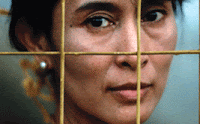This cursory exploration of contrasting styles of resistance, unveils some unexpected parallels with the current state of oppositional politics in
Daughters of Destiny
 Pro-democracy campaigner and Nobel Peace Laureate Aung San Suu Kyi, carries the hopes of Myanmese people squarely on her narrow shoulders. The petite framed leader of the opposition National League for Democracy (NLD) is hardly a symbol of fire-brand resistance and opposition. The daughter of assassinated de facto Prime Minister General Aung San (1947) came to prominence following the quelled nationwide democracy uprising. After spending 28 years outside of
Pro-democracy campaigner and Nobel Peace Laureate Aung San Suu Kyi, carries the hopes of Myanmese people squarely on her narrow shoulders. The petite framed leader of the opposition National League for Democracy (NLD) is hardly a symbol of fire-brand resistance and opposition. The daughter of assassinated de facto Prime Minister General Aung San (1947) came to prominence following the quelled nationwide democracy uprising. After spending 28 years outside of
In the 1990 snap general election held after the institution of marital law in 1989, Aung San Suu Kyi’s NLD clinched 82% of the popular vote despite the detention of herself and party members; a result we all know was not recognized by the ruling regime. Since then, arbitrary imprisonment and forced house arrests has shrouded her unfulfilled tenure as chosen leader.
Standing on the opposite end of the same boat is
A Tale of Two Regimes
As highlighted above, two of the world’s most recognized female politicians share uncannily similar histories and present realities. Recent triggers of their prominent return to the fore of domestic and international politics seemed timed like a
In an attempt to cool mounting International pressure for their handling of peaceful marches by protesting monks in September,

Approximately 3000 kilometers away, another military regime is coming under intensified domestic pressure for the firing of the nation’s top judge, the arrests of thousands of opposition politicians and lawyers, and wavering promises over election dates. President Musharraf was thus cornered into brokering a powersharing deal with Bhutto and granted her amnesty for her corruption charges; paving the way for her triumphant return.
Heroines on Different Paths
While the restoration of democracy runs in the veins of the two, it is interesting to note how each displays contrasting styles of engagement with their respective foes.
Bhutto had little intention of making a quiet return to Pakistani politics. When asked to delay her return to
Unlike the confrontational stance adopted by Bhutto, Aung San Suu Kyi had recently announced that she was willing to co-operate with the government to work towards national reconciliation. While still holding out for national healing (a first step being the release of political prisoners), Aung stressed the need for constructive and time-bound dialogue.
How the rest of their stories will play out is anyone’s guess and many plot twists remain. For Aung, dialogue can only be constructive granted both parties are genuine and come to the table as equals.
For Bhutto, she should beware the bite of a cornered dog as men in power guard that power jealously. Further, tyrannical and uncooperative regimes can only be overthrown by sustained and escalating popular uprisings; a throw back to the French Revolution when we are left to ask how much blood is enough. As often the case, only time will tell.
Do We Have Our Own Aungs and Bhuttos?
There are many similarities between
- ruling regimes criticized for being undemocratic and autocratic
- judiciaries that are not independent of executive powers
- constrained civil societies
- intolerant environment for opposition parties
- state controlled/regulated media
With this in mind, my mind drifted to our own oppositional counterpoints in
Much like the stance adopted by Aung San Suu Kyi, the present configuration of the WP prefers a less confrontational approach to oppositional politics. Party Secretary-General Low Thia Kiang spelled that out clearly by declaring that the opposition should be a watchdog rather than a “mad dog” opposing for opposition sake. To this, critics would throw the dreaded "PAP co-option" at them - selling out their values to gain political mileage by feeding off the scraps left on the table. Proponents on the other hand would hail their ability to slowly chip away at the defenses of the ruling party through policy debate and mild-mannered criticisms.
On the other end of the same boat, the SDP led by Chee Soon Juan prefers an approach underscored by active and persistent civil disobedience. Recent confrontations with police officers at high profile events and the deliberate flouting of public assembly and speaking laws naturally come to mind. Supporters and detractors are aplenty when it comes to "Chee tactics". Patriot or traitor? Hero or villain? Skilled strategist or raving mad man?
Do we have our very own Aung and Bhutto? I sure think so (metaphorically of course). Which tactic of resistance is your cup or tea ... or coffee?






1 comment:
This is my first time to visit and read your blog!!! I absolutely agree with your writings and opinions. I am a Burmese in Thailand.
Post a Comment